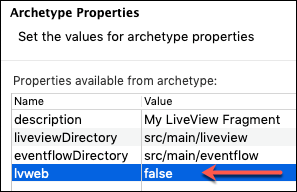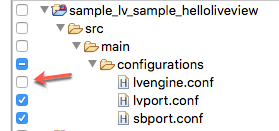Contents
This page describes the known limitations in the current release of TIBCO LiveView™. Each item includes a tracking number, description, and whenever possible, one or more workarounds.
| ClusterAlert | Cluster-wide Alert Group Restriction for Heterogeneous Clusters | |
| Description | Nodes with only EventFlow engines in LiveView clusters must be in their own alert groups. | |
| Workaround | See this page for cluster-wide alerting guidelines. | |
| SB‑46418 |
Removing lvweb.war dependency from a project's
POM does not remove the file, and vice versa.
|
|
| Description |
New LiveView Fragment projects are created by default with a dependency on
the lvweb.war file that implements LiveView Web
functionality. There are two cases: (1) If you later edit the project's
pom.xml file to remove that <dependency> element, doing so does not automatically
remove the lvweb.war file from the project's
src/main/liveview/lv-user-webapps folder. (2)
If you remove the lvweb.war file manually, the
pom.xml is not automatically edited to remove
the dependency.
|
|
| Workaround |
In both cases, you must both remove the lvweb.war file and edit the
pom.xml file to remove a project's support for
LiveView Web.
The correct way to create a new
LiveView project without LiveView Web support is to change the
|
|
| SB‑45720 | Failure to independently run or debug EventFlow modules in LiveView projects in 10.4.0 through 10.4.2. | |
| Description | Many LiveView projects have StreamBase EventFlow modules that provide functionality such as publishers or transformers of data. In releases 10.4.0, 10.4.1, and 10.4.2, right-clicking such modules and selecting > (or ) to run or debug the module independent of the enclosing LiveView project resulted in an error. This feature was restored in release 10.4.3. Note that this limitation did not prevent running the project as a LiveView fragment with all EventFlow modules working; the limitation was only on running the EventFlow modules by themselves. | |
| Workaround |
If you are using one of the affected releases, you can;
|
|
| SB‑44494 | Metadata store restriction for clusters containing LiveView and StreamBase fragments. | |
| Description |
The transactional memory metadata store type is only supported on homogeneous LiveView clusters. This means the
cluster cannot contain a mix of LiveView and StreamBase fragments when using
a transactional memory metadata store.
|
|
| Workaround | Use either the JDBC or H2 metadata store type when your cluster contains both LiveView and StreamBase fragments. | |
| CQS‑4800 | Row level security — authentication not performed on results of already-registered queries and query-based alerts. | |
| Description | Row level security (RLS) authentication and authorization is performed at the time when new query-based alerts and queries are registered with the LiveView server. LiveView does not perform authentication on the results of already-registered queries and query-based alerts; in order to get the expected results based on RLS authentication, you must re-register the queries with the server. | |
| Workaround | None. | |
| CQS‑4748 |
Do not use the liveview.project.out system
property.
|
|
| Description |
The liveview.project.out system property was
recommended in previous releases as a way to manage the placement of the
LiveView server's compilation working directory. However, if you redirect
this working directory in StreamBase 10 applications, the StreamBase
application may fail to start correctly.
|
|
| Workaround | None. | |
| CQS‑4641 | Issuing queries with literal non-printing characters is not supported in query strings. | |
| Description | Query strings with literal non-printing characters can cause issues. Non-printing characters are those below 0x20, excepting tab, carriage return, and line feed. Note that tables and query result sets are free to have any characters as values. | |
| Workaround |
Instead use StreamBase Unicode escape sequences, which looks like
\uXXXX. For example, a bell is \u0007.
|
|
| CQS‑4467 |
An aggregate query with HAVING clause and LIMIT specified may throw a
Query updates exceeded specified limit error
when the number of rows returned are less than the specified LIMIT.
|
|
| Description | When issuing an aggregate query with a HAVING clause and LIMIT applied, returned rows may be less that the specified LIMIT (even none). This is because LIMIT is applied to the rows returned before the HAVING predicate filter. | |
| Workaround |
If the HAVING predicate is expected to filter a large number of rows, use a
very large LIMIT or no LIMIT. For non-aggregate queries with a HAVING and
LIMIT, the number of rows you get before getting a Query updates exceeded specified limit is appropriate.
|
|
| CQS‑3855 |
Remote data source tables with sole primary key CQSInternalID cannot be opened.
|
|
| Description |
When querying a remote data source's tables, all LiveView clients fail to
open any remote table that uses a single primary key named CQSInternalID.
This issue affects all LiveView clients, including TIBCO LiveView Desktop, TIBCO LiveView Web, the lv-client command line utility, and any custom client written using LiveView Client APIs. The issue occurs when querying any remote data source, including: TIBCO StreamBase Query Tables, other LiveView servers, JDBC databases, TIBCO ActiveSpaces tables, and custom table providers. |
|
| Workaround |
You can use one of the following suggestions to enumerate the remote tables
that you must avoid. 1. If your client can sort its list of available remote
tables, sort it by the Indexes column to isolate the tables that have only
CQSInternalID as their primary key. 2. Use the following query to determine
the remote tables to avoid opening:
select * from LVTables where Indices=='CQSInternalID' |
|
| CQS‑3383 | LiveView Desktop can return results into one column instead of several. | |
| Description | Under some circumstances, if a query starts, then ends very quickly in an error condition (such as reaching a row limit almost immediately), LiveView Desktop might display the results using a single, unlabeled column, with every data row showing field values separated by commas, rather than displaying them in individual columns. | |
| Workaround | Investigate the cause of the error condition and correct it, if possible, perhaps by increasing the row limit value. | |
| CQS‑3287 | LiveView with multiple count_distinct() expressions in one projection can return invalid results. | |
| Description | If a Data Table has any case insensitive fields, and a query has a projection with more than one count_distinct() function with identical parameters, the resulting count_distinct values are likely to be incorrect. | |
| Workaround | None. It is expected to be very unusual that a projection would have more then one count_distinct() function with identical parameters. | |
| CQS‑2820 | Time-windowed predicates not working as expected in author-time aggregation. | |
| Description |
In author-time aggregation, where you enter a query in an aggregation data
table's lvconf definition, the predicate must always start with a simple
StreamBase expression that results in a Boolean type. You cannot start with a
time-windowed predicate expression such as when
transactionTime between now()-minutes(5) and now().
|
|
| Workaround |
If you only want a time-windowed expression in the <predicate> element
of the lvconf, prefix it with the simple StreamBase expression true. For example:
|
|
| CQS‑1692 | Referencing a JDBC table that has not been properly loaded prevents LiveView Server from starting. | |
| Description | JDBC tables are not automatically started as part of a LiveView Server project start. This means that if you configure a project with a JDBC table, you must load the database before starting LiveView Server. | |
| Workaround | Start the JDBC database before starting LiveView Server. | |
This section provides a list of errors corrected in release 10.6.3 of the TIBCO LiveView™ component of TIBCO® Streaming.
| Fixed in 10.6.3 | |
|---|---|
| Number | Resolution |
| TIBCO LiveView™ 10.6.3 incorporates all fixes resolved in the release 10.0 series through 10.6.2 and all fixes resolved in the release 2.2 series through 2.2.8. | |


